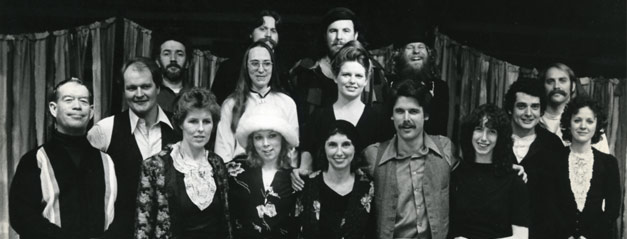
Unicorn Theatre Players
“Spoon River Anthology,” performed in 1980 at Community Hall, included cast members Laurel Wagers, Deborah McShane, Karen Bowers, David Gunter, Eric Schneider, Jana Weaver, Terry Hayes, Keith Fisher, Gene Hughes King, John Tucker, Nick Robinson and Susie Fuller.
|
|
The theater hath not been dead,Though it hath slept
By Teresa Pesce
It’s been a long time since the Unicorn Theatre Players vanished from the Sandpoint scene, leaving two mysteries in its wake. Why did it end, and why hasn’t another theater group taken its place?
The answers are found in theater’s organic essence: a wheel with an artistic director as the energy hub, spoked with hard-working talent and rimmed by faithful audiences, all propelled by a unified creative vision. If any part of the whole malfunctions, breakdown occurs.
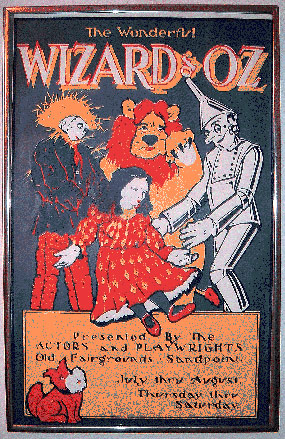
“The Wonderful Wizard of Oz” was a well-received children’s production by Robin DuCrest’s theater company, circa 1975
|
|
Long-term theater participants Karen Bowers, director of the Panida Theater for 21 years, and actor/director David Gunter yield colorful tales of theater’s past in Sandpoint: celebrated productions, thank-the-Academy thespians, and directors with the transforming perseverance of Henry Higgins and the persuasive powers of Svengali to fan an actor’s embers into flame; and, on the other sad side, defeating creative clashes and power struggles muscled by money.
Theater is a living force that waxes and wanes but never dies; merely going dormant, awaiting someone to embody it and express it onstage once again. Sandpoint has been visited by several “someones.” Bowers vividly recalls the meteor-streak Robin DuCrest, burning brightly across Sandpoint skies in the late ’60s and ’70s as a brilliant director, writer and playwright. “To this day I remember his Actors and Playwrights’ production of ‘The Wonderful Wizard of Oz’ at (the old fairgrounds at) Memorial Park, and the last play he did, ‘Catfish Moon,’ which he also wrote, staged at Farragut Park.”
Then in 1979, Terry Hayes created the Unicorn Theatre Players. “She had so much energy,” says Bowers, leaning forward at the mere memory of it, “with an eye for working with people as good directors do, having the vision ahead of time, reading a play, ‘seeing’ it and taking it to a conclusion.”
Gunter clearly remembers the years of Unicorn Theatre’s artistic strength and community popularity. “There was a great groundswell of energy, all new, everything fresh – everybody throwing themselves in pursuit of virgin territory. The group was dynamic, doing several productions a year, plus dinner or dessert theater,” he says. “We had a summer musical so successful it funded all other productions. And our children’s productions were the second-biggest money-makers.
“As with any organization, core people tend to get burned out,” Gunter adds. “The same people would be in a play, as well as involved in myriad aspects of it before, during and after.”
As the core group’s energy flagged, the shining coin of creative energy flipped and landed on its opposite side: creative control. Two camps slowly took shape. The director of the summer musicals and children’s productions attracted a devoted following, “virtually hijacking that aspect of the theater group,” Gunter says. “This group felt their financial success should grant them leverage to influence which plays should be done, who should direct and who should be cast. It appeared to be an attempt at an artistic coup.”
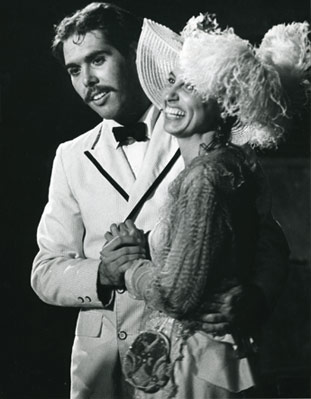
The cast of “The Matchmaker,” performed in 1981 by Unicorn Theatre at the Panida, included David Jones and Karen Bowers.
|
|
At first, other Unicorn participants considered this harmless, especially since it was hard to argue with success. They also preferred not to take sides, instead devoting their energies to their own projects. “As you could almost hear the Unicorn’s death rattle, people on the periphery put on real strong productions,” says Gunter. “Bonnie Miller did Sondheim’s ‘Into the Woods,’ an aggressively challenging production which went very well. Another group of former Unicorn people mounted a great musical production of ‘The Secret Garden’ with Bryn Nelson directing and drew great crowds.”
Bowers, who joined the Unicorn Theatre two years after its inauguration and served as president as well as producer and actress, clearly recalls those strained days. “The Unicorn board of directors was divided between two strong views on what theater was. One was the team approach and … ,” referring to the same director described by Gunter, “ … the other was director-as-god, having total control and dictating to the actors how to interpret their roles, say their lines and move, with no creativity on the actor’s part. It was very old-school. Still, it worked well for a while with well-known musicals.”
As these dynamics eroded Unicorn Theatre from the inside, a growing variety of community organizations and activities affected it from the outside, as members became busier in daily life. “The more Sandpoint grew, the less time people had,” says Bowers.
The pervading mood was political and confrontive, not creative and cooperative, and the Unicorn bowed its head and vanished in 1997.
Other theatrical enterprises have done well along the way, but none has established another enduring community theater.
Su Coffey-Berg, for example, founded the Performing Arts and Humanities of Sandpoint in 1991 and headed up several children’s productions through the bulk of the ’90s, such as “Peter Pan” and “Annie.” For a time, the organization even had its own building, at 506 Oak St., for rehearsals and performances. In 1998, Coffey-Berg moved to Colorado, however, again leaving a gaping hole in Sandpoint’s performing arts scene.
In discussing the subject of theater in Sandpoint, everyone involved can cite a roster of talented directors, producers and actors. But everyone also agrees on the missing element.
Rob Kincaid, founder of Flat Hat Productions, which provides musical events for the community, voices the general consensus when he says, “No one person is staying with the process long enough to create a new theater.”
It’s the long-term commitment that has been missing – someone with the vision to build a venue and the time to make it happen. Theater is a political phenomenon as well as a creative one, and the growing pains can be worse than the birth. Few have the stamina to support the process.
Recently, Bowers and Deborah McShane, a gifted director and former Unicorn pillar, tried to revive theater with The Looking Glass Theatre Company but were thwarted by the recalcitrant time element. “We were able to do ‘The Laramie Project,’ ‘Aesop’s Fables’ and, in conjunction with the group that ultimately became Flat Hat Productions, ‘You’re a Good Man, Charlie Brown.’ But eventually, time became a serious issue,” says Bowers.
“Time was an issue for everyone,” Kincaid agrees. “We all have jobs.”
So there has been a “waiting” since the Unicorn topped the horizon and disappeared … an expectation of the next shooting star, someone with time to make a lasting commitment toward building a new Sandpoint theater group. And a recent sighting has indeed occurred, with many observing it and voicing their views.
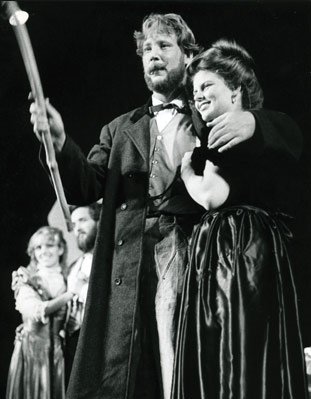
The cast of “The Matchmaker,” performed in 1981 by Unicorn Theatre at the Panida, included John McShane and Laurel Wagers, who played the matchmaker.
|
|
The new “someone” is Kathleen Mazolla, founder and artistic director of the new Sandpoint Theatre Company. A celebrated theater director from Malibu, Calif., Mazolla brings vision and a passionate commitment to professional theater in the community.
In 1979, Sandpoint was ready for the Unicorn. “They were a catalyst for things already in motion, and they began the golden years with a wonderful core of people acting and directing,” Gunter says.
Apparently, in 2008, the town was ready again. The new Sandpoint Theatre Company’s premier production last summer, “The Black Box Comedy Project,” sold out with a holdover performance and was received with scream-laughter and hand-numbing applause. Many are asking how they can be part of the company (“Audition!” is Mazolla’s invitation to one and all). A theater-seasoned community is beginning to warm to the newcomer. Bowers says, “I was so excited when I attended the first meeting of the Sandpoint Theatre Company. I knew someone would come and make it happen.”
“The community sensed a gap, something lacking,” says Gunter, “and it would be great to see them thrive.”
“Nobody loses when someone is successful,” adds Kincaid, “and everyone is hoping they succeed.”
Mazolla is breaking up the fallow ground with comedy, following the adult-themed vignettes of “The Black Box Comedy Project” with the sly “Murder at the Castle,” a camp who-done-it set in 1920s England that was written by a member of the company and the playwright workshop.
Mazolla also has other projects in the works, including romantic comedies, dark comedies, musicals and children’s theater, and unexpected forays into the world of Westerns and Shakespearean-type verse. The scripts are all originals by local playwrights, although she plans established works as well. “But not the ones done a thousand times,” she adds, revealing that she has just enough of a daring streak to keep things interesting.
“I don’t want to play it safe. If we do something classical, I want the emotional life of the piece to matter to our audience, the way ‘West Side Story’ presented ‘Romeo and Juliet.’ Hopefully, people will come from Coeur d’Alene and Spokane to see the work.”
Mazolla’s vision extends beyond stage into an integrated, theatrical coming-of-age for Sandpoint, and yet the heart of her hope is simple: “I want people to have a safe place to explore their creativity in a supportive environment where their gift is developed, and more than that, honored.”
How this will “play out” in the onstage realm will be plain for all to see in the new company’s upcoming productions. For observers of the stars, Sandpoint Theatre Company is one constellation to watch.
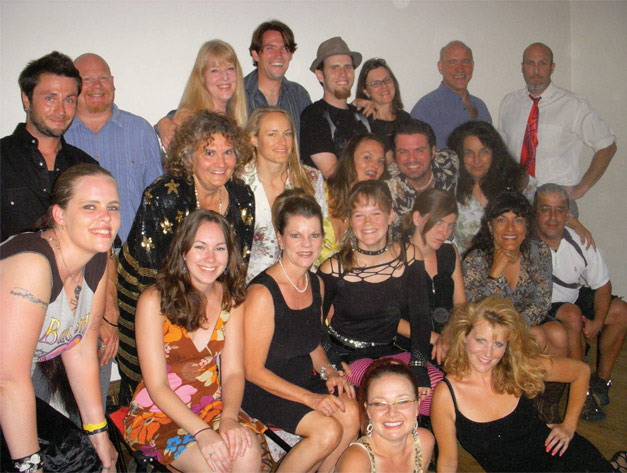
The cast of “The Black Box Comedy Project” broke ground for Sandpoint Theatre Company in July 2008.
|
|
|